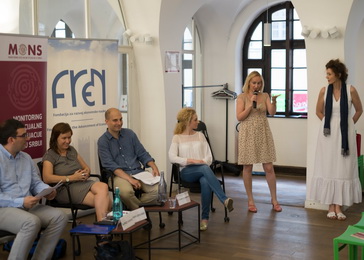 Children and young people from the underprivileged social groups in Serbia do not have equal opportunities for successful education, realizing their potentials, and fully contributing to society, a conclusion was made at a panel discussion dedicated to inequalities in education. The discussion was organized on the occasion of presenting the new issue and theme on the online platform for monitoring the social situation in Serbia—MONS (www.mons.rs).
Children and young people from the underprivileged social groups in Serbia do not have equal opportunities for successful education, realizing their potentials, and fully contributing to society, a conclusion was made at a panel discussion dedicated to inequalities in education. The discussion was organized on the occasion of presenting the new issue and theme on the online platform for monitoring the social situation in Serbia—MONS (www.mons.rs).
According to Danilo Vuković from the SeConS development initiative group, Assistant Professor at the Faculty of Law at the University of Belgrade, the Serbian education system is closed at several key points for children from lower social classes. The very process of education deepens inequalities, as the process of learning has moved from the school to the family home. Vuković noted that children are increasingly using private tutoring, while those from the underprivileged groups use additional and private lessons less, they rarely learn foreign languages outside school, go to music school, or practice sports.
As a result, underprivileged children have a higher chance of ending up in poorly paid jobs, in poverty, and in social exclusion. A young person in Serbia whose parents have elementary education today has as much as 79 times less chance of completing a college or university compared with a person whose parents have higher education.
Lara Lebedinsky, a researcher from the FREN Foundation for Economic Science, points out that investing in early childhood development is very important because investment in pre-school education has the highest return rate through growth in gross domestic product and economic development. Lebedinsky says that the biggest problem is that our country’s pre-school education does not covered the most underprivileged children, who would most benefit from it in that it would help them to reduce inequalities that stem from their socio-economic position.
Vitomir Jovanović, a researcher at the Center for Educational Policies, talked about the importance of education for poverty reduction in Serbia, pointing out that finishing high school reduces the risk of poverty by nearly half.
As the MONS authors already showed in the first issue, high inequality poorly affects economic growth and its sustainability, and one of the reasons for the extremely high inequality in the distribution of income in Serbia are unequal opportunities and chances for education.
Source: secons.net
 Government of the Republic of Serbia
Government of the Republic of Serbia















 pdf [271 KB]
pdf [271 KB]
Leave a Comment